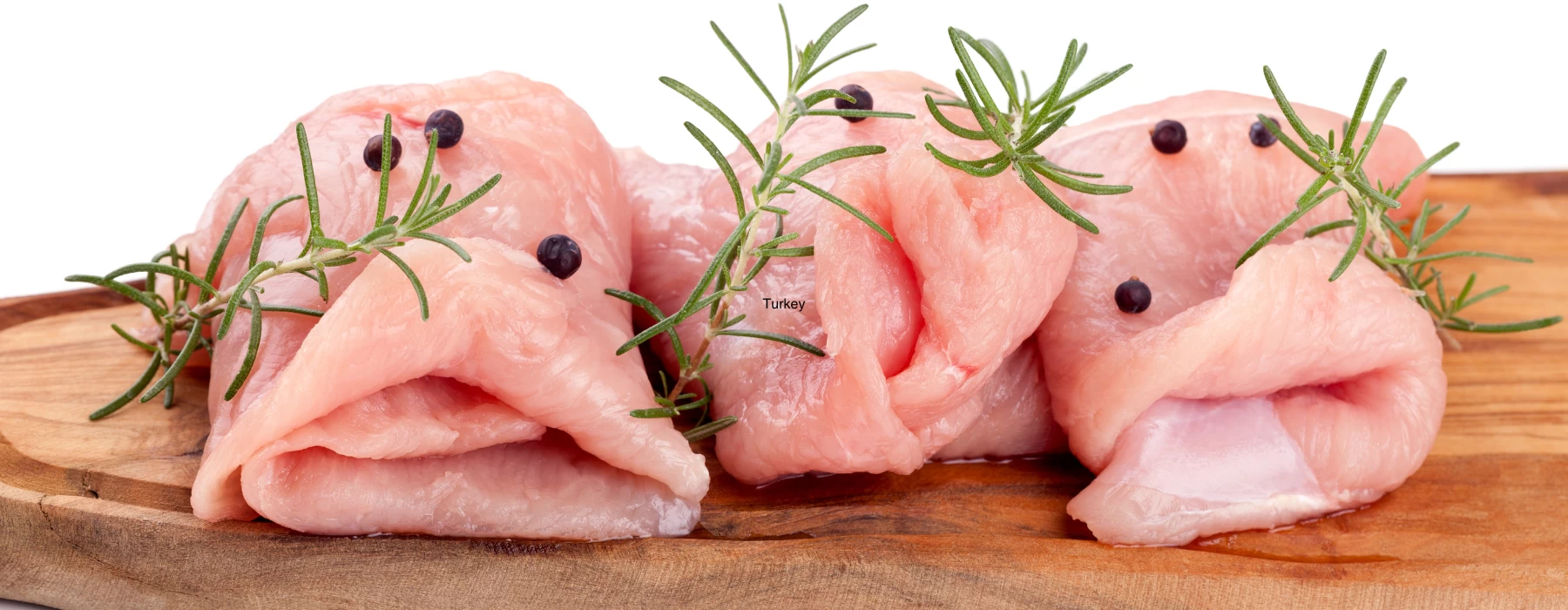
Turkey is a large bird, known for it’s highly nutritious meat. It is one of the most common protein sources all over the world. Nutritional facts of two thick slices of turkey (85 gms):
|
Calories |
117 |
|
Protein |
24 grams |
|
Fat |
2 grams |
|
Carbs |
0 grams |
|
Niacin |
61% of RDI |
|
Vitamin B6 |
49% of RDI |
|
Vitamin B12 |
29% of RDI |
|
Selenium |
46% of RDI |
|
Zinc |
12% of RDI |
|
Sodium |
26% of RDI |
|
Phosphorus |
28% of RDI |
|
Choline |
12% of RDI |
|
Magnesium |
6% of RDI |
|
Potassium |
4% of RDI |
Like chicken, the nutrient content of turkey also depends upon the cut. Dark meat found in active muscles contain more calories and fats as compared to the white meat. White meat contains more protein. The skin of turkey is high in fat. So, skinless cuts are lesser in calories and fat as compared to the pieces containing skin.
Turkey has several potential health benefits. It is packed with high amounts of protein. Protein is the building block of the body, needed for muscle growth and maintenance. Protein is also involved in the transport of nutrients all over the body. The high quantity of protein present in turkey causes fullness for a long time, reducing the total calorie intake. So, turkey is a very good option to be included in a weight loss diet.
Only two thick slices of turkey can provide you 24 grams of protein. Also, it can be considered as a healthier alternative for red meat. Red meat may increase the chances of colon cancer and heart disease.
According to some other studies, processed meat- not the red meat itself- is the main cause of negative effects on health. In addition to protein, turkey is also an excellent source for Vitamin B, including B3 (niacin), B6 (pyridoxine), and B12 (cobalamin). It also contains good amounts of Vitamin B1 and B2.
Vitamin B3 is needed for efficient energy production and cell communication. Vitamin B6 supports amino acid formation and helps produce neurotransmitters. Vitamin B12 is involved in DNA production and formation of red blood cells. Turkey is zipped with fair amounts of selenium, zinc, and phosphorus. It also contains magnesium and potassium in trace amounts. Selenium is essential for the production of thyroid hormones, which regulates the metabolism and growth rate.
Zinc performs many functions in the body, including gene expression, protein synthesis, and enzyme reactions.
Although turkey meat is very beneficial, the processed meat contains loads of salt. Salt is used as a preservative and for enhancing the flavor. According to research higher sodium intake is linked with stomach cancer whereas a diet lower in sodium may reduce high blood pressure.
Sodium percentage of different turkey products per 100 grams:
|
Products |
Sodium |
|
Salami and pastrami |
75% of RDI |
|
Sausage |
60% of RDI |
|
Unprocessed |
31% of RDI |
Overall, turkey meat may support various aspects of health, including muscle growth and maintenance, due to its rich supply of nutrients.